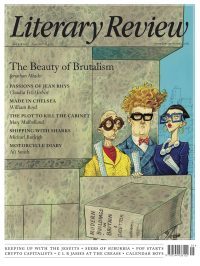Joanna Moncrieff
Madness & Mistreatment
Desperate Remedies: Psychiatry and the Mysteries of Mental Illness
By Andrew Scull
Allen Lane 512pp £25
Andrew Scull’s new book is an important plea for psychiatrists not to be seduced into offering a cure that is worse than the disease. When speaking to psychiatrists, I frequently encounter the sentiment that we must do something to ‘treat’ people suffering from mental distress (indeed that it is quite immoral not to do so), no matter if our interventions show little evidence of being helpful. This sort of thinking is driving the current craze for psychedelic drug therapies, for example, which are often aimed at those who have ‘failed’ standard treatments and are thus particularly vulnerable to the enticements of novel remedies.
Scull never minimises the suffering that people with severe mental disorder experience and the burden this can place on families and society. He is highly critical of successive US governments, which have basically defunded public mental-health care since the large-scale closure of asylums, leaving many of the long-term mentally ill to live on the streets or in cheap boarding houses. Yet the book also suggests that overenthusiastic intervention is no better or worse than neglect, and that modern psychiatric treatments are little different from their precursors, bringing partial relief to only a few and inflicting discomfort and disablement on many.
Scull’s engaging account of the development of psychiatry and psychiatric treatments since the 19th century shows history repeating itself many times over. One hoped-for cure for mental distress follows another, resembling more the ups and downs of fashion than the conventional processes of science. In the early 19th

Sign Up to our newsletter
Receive free articles, highlights from the archive, news, details of prizes, and much more.@Lit_Review
Follow Literary Review on Twitter
Twitter Feed
Under its longest-serving editor, Graydon Carter, Vanity Fair was that rare thing – a New York society magazine that published serious journalism.
@PeterPeteryork looks at what Carter got right.
Peter York - Deluxe Editions
Peter York: Deluxe Editions - When the Going Was Good: An Editor’s Adventures During the Last Golden Age of Magazines by Graydon Carter
literaryreview.co.uk
Henry James returned to America in 1904 with three objectives: to see his brother William, to deliver a series of lectures on Balzac, and to gather material for a pair of books about modern America.
Peter Rose follows James out west.
Peter Rose - The Restless Analyst
Peter Rose: The Restless Analyst - Henry James Comes Home: Rediscovering America in the Gilded Age by Peter Brooks...
literaryreview.co.uk
Vladimir Putin served his apprenticeship in the KGB toward the end of the Cold War, a period during which Western societies were infiltrated by so-called 'illegals'.
Piers Brendon examines how the culture of Soviet spycraft shaped his thinking.
Piers Brendon - Tinker, Tailor, Sleeper, Troll
Piers Brendon: Tinker, Tailor, Sleeper, Troll - The Illegals: Russia’s Most Audacious Spies and the Plot to Infiltrate the West by Shaun Walker
literaryreview.co.uk